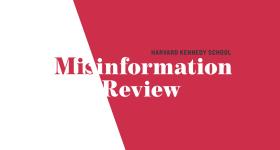Graggle: A Graph-based Approach to Document Clustering
In this work, researchers have designed and implemented a new system they call Graggle, which builds a graph to model a corpus.


Graggle: A Graph-based Approach to Document Clustering
In this work, researchers have designed and implemented a new system they call Graggle, which builds a graph to model a corpus.

Economic risk framing increases intention to vaccinate among Republican COVID-19 vaccine refusers
The COVID-19 pandemic remains a global threat to lives, livelihoods, and lifestyles.

Beyond Digital "Echo Chambers": The Role of Viewpoint Diversity in Political Discussion
Modern political conversations are typically perceived to be unproductively affirming -- siloed in "echo chambers" of exclusively like-minded discussants.

Cigarette smoking among sexual and gender minority (SGM) groups in the United States is higher than heterosexual and cisgender individuals.

Fact-checking Trump’s election lies can improve confidence in U.S. elections: Experimental evidence
As the 2020 campaign unfolded President Trump’s attacks on the integrity of the U.S. electoral system grew louder and more frequent.

To enter or stay in the US market, tobacco manufacturers must submit a Premarket Tobacco Product Application (PMTA) to the Food and Drug Administration (FDA).

The researchers conducted experiments to evaluate the immediate and medium-term effects of misinformation and factual corrections during the 2020 election.

"It's Not Just Hate'': A Multi-Dimensional Perspective on Detecting Harmful Speech Online
Well-annotated data is a prerequisite for good Natural Language Processing models.

New information technologies increasingly allow autocrats to shape public opinion outside their borders.

A Missed Opportunity to Further Build Trust in AI: A Landscape Analysis of OECD.AI
The world needs a better understanding of how policymakers can effectively encourage AI innovation and adoption, while mitigating potential AI risks.
